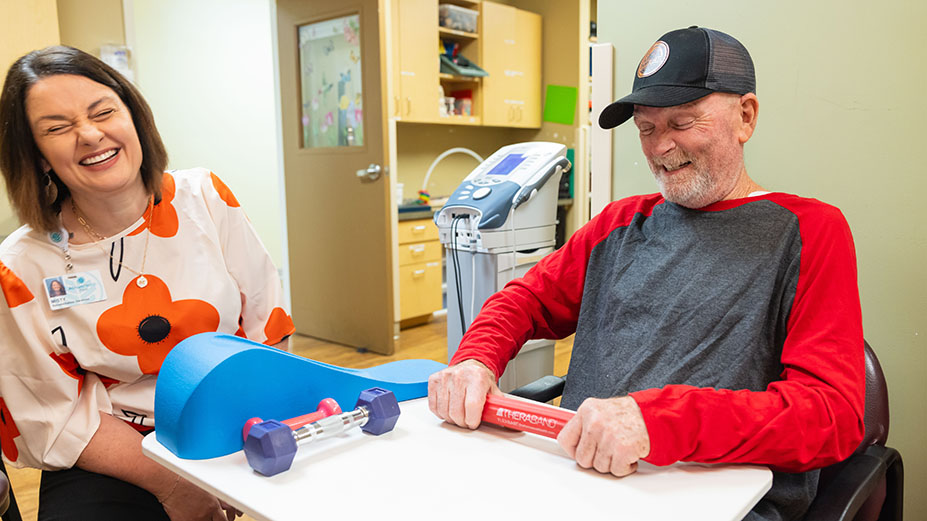Floyd Man’s Call to Atrium Health Navicent Nurse Raised Stroke Concerns
She urged him to seek care quickly at Atrium Health Floyd Medical Center

ROME, Ga., May 29, 2025 – Lee Wright says he is a walking miracle. His miracle is one that spans the breadth of Atrium Health’s coverage in Georgia and one that points to the importance of having sister hospitals across the state.
Wright, who lives in Floyd County, had worked all day. It was Thanksgiving week, and the 70-year-old had climbed four roofs that day. He decided to take a break in his recliner and call his granddaughters, who live in the Macon area. While on the phone, he told their mom, Erika Wright, how he was feeling after such a full day.

Erika has been a nurse at Atrium Health Navicent The Medical Center in Macon since 2017. Emergency medicine is her calling, she says. She doesn’t remember exactly what Wright said, but she does remember hearing “red flags” that caused her to halt the conversation.
“I told him he needed to go into the bathroom and do a couple of tests for me. I was trying to determine what I could do on the phone,” Erika said. “After he told me a little bit about what he was noticing and what he was seeing, I told him he had three hours to be inside a hospital.”
She directed him to Atrium Health Floyd Medical Center, knowing the hospital is a primary stroke center. Wright later told her that her words were spoken with such urgency that he went right away.
When he arrived at Floyd Medical Center, his symptoms had begun to worsen. He had lost control of his left foot, and he was having trouble speaking.
“I have never seen so many people move so fast,” Wright recalls. “In a matter of minutes, I had IVs in every part of my body, and I had been scanned.” He was diagnosed with a 70% blockage in his carotid artery.
He remembers Kallianna Maddox, the nurse who helped him when he first arrived in the Emergency Care Center. She stayed with him for the next three hours.
“She never left my side. She didn’t go get a drink or go to the bathroom. Nothing,” he said, obviously impressed. Wright’s care team injected him with TPA, a reliable treatment for stroke-causing blood clots.
“During that 3 hours I went from fully paralyzed and not talking to where I could have gotten up and run a race. It was just amazing to me,” Wright said. Over the course of those same three hours, Erika was driving to Rome to check on him.
Wright had surgery to open his artery the next day, but he had another stroke while in recovery, sending him back to the operating room. The next day a nurse walked into this room and asked if he wanted his lights turned on. He told her no.
“I basically thought my life was over,” he said.
She returned the next day with the same question. Wright again told her no. She was compassionate and abided by his wishes, he said. His room remained dark. The nurse returned a third time and Wright told her to keep the lights off. This time, her response was different.
“You misunderstood,” she told him. “I didn’t ask.”
The nurse then turned on the lights and raised the blinds, flooding Lee’s hospital room with light. A licensed pilot, Wright’s room overlooked the helipad at Atrium Health Floyd Medical Center. From his bed, Wright saw a helicopter land.
“I saw LifeFlight come in, and it dawned on me that I’m having a bad day, but that person is having a worse day. That nurse brought me back,” Wright said through tears.
He was eventually transferred to inpatient rehab, where, he said, he met more nurses and physical therapists who provided excellent care. He did his best to keep a list of their names to write a letter of gratitude.
One nurse, Heather Loveless, “was an angel from start to finish,” he said. “Heather would do what needed to be done and allow me to keep my dignity and self-worth intact. I can’t say enough about Heather. She should be the instructor teaching every new nurse how to have empathy, caring and allow a person to have their dignity.”
Rehab aide Charissa Loudermilk anticipated his needs and met them before he could even ask, he said. Noticing Wright was struggling with his meals, Billy Velasquez, a food and nutrition teammate opened every package and carton and cut every food item into bites each time he delivered his meals.
“He’s probably one of the lowest paid persons at your facility. He didn’t have to do it, but he took two minutes out of his life to help me, and that made me know I was going to be okay,” Wright said.
He was discharged from the hospital after 17 days. Now, he comes to outpatient physical therapy and occupational therapy as he continues to recover.
“All these people are making a difference in people’s lives,” Wright said. “I’m a walking miracle, and I attribute that to God and your people. They were the right people, and I’m glad they were there.”
About Atrium Health Floyd
The Atrium Health Floyd family of health care services is a leading medical provider and economic force in northwest Georgia and northeast Alabama. Atrium Health Floyd is part of Charlotte, North Carolina-based Advocate Health, the third-largest nonprofit health system in the United States, created from the combination of Atrium Health and Advocate Aurora Health. Atrium Health Floyd strategically combined with Harbin Clinic in 2024 and employs more than 5,200 teammates who provide care in over 40 medical specialties at four facilities: Atrium Health Floyd Medical Center – a 361-bed full-service, acute care hospital and regional referral center in Rome, Georgia; Atrium Health Floyd Polk Medical Center in Cedartown, Georgia; and Atrium Health Floyd Cherokee Medical Center in Centre, Alabama; and Atrium Health Floyd Medical Center Behavioral Health, also in Rome. Together, Atrium Health Floyd and Harbin Clinic provide primary care, specialty care and urgent care throughout northwest Georgia and northeast Alabama. Atrium Health Floyd also operates a stand-alone emergency department in Chattooga County, the first such facility to be built from the ground-up in Georgia.
About Advocate Health
Advocate Health is the third-largest nonprofit, integrated health system in the United States, created from the combination of Advocate Aurora Health and Atrium Health. Providing care under the names Advocate Health Care in Illinois; Atrium Health in the Carolinas, Georgia and Alabama; and Aurora Health Care in Wisconsin, Advocate Health is a national leader in clinical innovation, health outcomes, consumer experience and value-based care. Headquartered in Charlotte, North Carolina, Advocate Health services nearly 6 million patients and is engaged in hundreds of clinical trials and research studies, with Wake Forest University School of Medicine serving as the academic core of the enterprise. Advocate Health is nationally recognized for its expertise in heart and vascular, neurosciences, oncology, pediatrics and rehabilitation, as well as organ transplants, burn treatments and specialized musculoskeletal programs. Advocate Health employs more than 160,000 teammates across 69 hospitals and over 1,000 care locations and offers one of the nation’s largest graduate medical education programs with over 2,000 residents and fellows across more than 200 programs. Committed to redefining care for all, Advocate Health provides more than $6 billion in annual community benefits.




